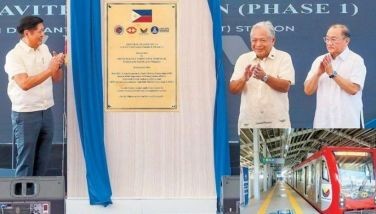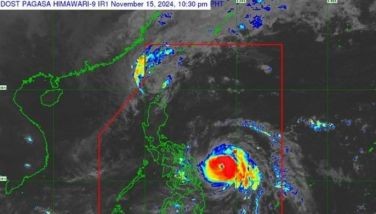Poll: 48% of Pinoys favor ‘initiative’ as Cha-cha mode
July 27, 2006 | 12:00am
Almost half, or 48 percent, of Filipinos polled by survey firm Pulse Asia consider people’s initiative as the best way of amending the Constitution.
On the other hand, congressional action through constituent assembly or constitutional convention is favored by the remaining 52 percent of respondents, according to Pulse Asia’s July 2006 Ulat ng Bayan national survey on constitutional change. They are, however, split between constituent assembly (28 percent) and constitutional convention (23 percent).
Between March and July 2006, there were more Filipinos considering people’s initiative as the best method for Charter change. A similar survey conducted by Pulse Asia last March showed that only 40 percent of respondents were for people’s initiative.
There are, however, fewer Filipinos who favor constitutional convention now. From 30 percent of survey respondents last March, only 23 percent in the most recent survey favor constitutional convention. The figures for the constituent assembly in the March survey did not change.
The preference for people’s initiative, which is defined in the survey as "one where citizens themselves are the ones who will propose the changes or amendments in accordance with conditions set by the Constitution," is highest in the Visayas at 57 percent and lowest in the National Capital Region (NCR) at 41 percent.
It is also the most favored mode of changing the Charter among the D class at 50 percent.
Consistent with the majority’s preference for people’s initiative, almost seven in 10 Filipinos are aware of the signature drive for Charter change done in March and April 2006. The level of awareness on the signature drives is highest in Metro Manila at 84 percent, especially the upper classes (87 percent).
However, a majority (59 to 70 percent) is not in favor of the manner with which the signatures were collected.
Malacañang said that the favorable results of the survey vindicated the Arroyo administration’s thrust for political reforms and would silence critics that Filipinos are not informed about the campaign to amend the Constitution.
"It shows that the people are becoming more aware of the Charter change as an issue and now it has even gone up to a point where they are already talking about the mode," Executive Secretary Eduardo Ermita said in a press conference.
He said the Charter Change Advocacy Commission (Ad-com) would intensify their information campaign to swing the undecided to support the proposed amendments to the Charter.
Most Filipinos, however, appear to view constitutional change as lacking urgency. Less than half of those surveyed (40 percent) say they are likely to cast a vote if a plebiscite on Charter change were held today.
The pattern, according to the Pulse Asia report, generally holds across geographic areas and socio-economic classes, with only the poorest E class having a majority of those who are likely to vote.
The percentage of Filipinos who are undecided and not in favor of changing the Constitution are highest in Metro Manila, with 22 percent saying they are undecided about the issue and 45 percent saying they are not in favor of the move at all.
Nationwide, the indecision regarding the timeliness of Charter change is reflected by 21 percent of those surveyed.
Ad-com chairman Lito Monico Lorenzana, however, is unfazed. He said Filipinos who are in favor of changing the Constitution are "steadily growing."
"What should be emphasized here is that out of the 48 percent who strongly support people’s initiative as a mode to change the Charter, 15 percent are in favor of the approach of gathering signatures. This alone suggests that the 15 percent meet the required 12 percent of the total registered voters nationwide and three percent in each legislative district as provided under RA 6735 or the Initiative and Referendum Act," Lorenzana said in a statement.
The Pulse Asia survey, he added, is also directly opposite the findings of the Social Weather Stations’ (SWS) survey conducted also in March and June this year that showed that those who are against Charter change have grown to a solid majority.
The ad-com chairman said that the June 2006 survey of SWS "deliberately took advantage of President Arroyo’s low approval ratings to generate negative responses."
Meanwhile, topping the news headlines at the time the Pulse Asia survey was being conducted were reports regarding the serial filing of impeachment complaints against the President, her declaration of an all-out war against communist rebels and the government’s rejection of the National Democratic Front’s call for the revival of peace talks.
Other hot issues were the abolition of the death penalty, the granting of a P25-wage hike to Metro Manila workers, the probable filing of impeachment complaints against several election officials due to anomalies in the poll automation project, the military’s recommendation to file charges against 38 military officers and 27 enlisted Army personnel for alleged involvement in the failed coup last February, the changing of the guard at the Philippine National Police and the recapture of six rebel Magdalo officers. — With Aurea Calica, Paolo Romero
On the other hand, congressional action through constituent assembly or constitutional convention is favored by the remaining 52 percent of respondents, according to Pulse Asia’s July 2006 Ulat ng Bayan national survey on constitutional change. They are, however, split between constituent assembly (28 percent) and constitutional convention (23 percent).
Between March and July 2006, there were more Filipinos considering people’s initiative as the best method for Charter change. A similar survey conducted by Pulse Asia last March showed that only 40 percent of respondents were for people’s initiative.
There are, however, fewer Filipinos who favor constitutional convention now. From 30 percent of survey respondents last March, only 23 percent in the most recent survey favor constitutional convention. The figures for the constituent assembly in the March survey did not change.
The preference for people’s initiative, which is defined in the survey as "one where citizens themselves are the ones who will propose the changes or amendments in accordance with conditions set by the Constitution," is highest in the Visayas at 57 percent and lowest in the National Capital Region (NCR) at 41 percent.
It is also the most favored mode of changing the Charter among the D class at 50 percent.
Consistent with the majority’s preference for people’s initiative, almost seven in 10 Filipinos are aware of the signature drive for Charter change done in March and April 2006. The level of awareness on the signature drives is highest in Metro Manila at 84 percent, especially the upper classes (87 percent).
However, a majority (59 to 70 percent) is not in favor of the manner with which the signatures were collected.
Malacañang said that the favorable results of the survey vindicated the Arroyo administration’s thrust for political reforms and would silence critics that Filipinos are not informed about the campaign to amend the Constitution.
"It shows that the people are becoming more aware of the Charter change as an issue and now it has even gone up to a point where they are already talking about the mode," Executive Secretary Eduardo Ermita said in a press conference.
He said the Charter Change Advocacy Commission (Ad-com) would intensify their information campaign to swing the undecided to support the proposed amendments to the Charter.
Most Filipinos, however, appear to view constitutional change as lacking urgency. Less than half of those surveyed (40 percent) say they are likely to cast a vote if a plebiscite on Charter change were held today.
The pattern, according to the Pulse Asia report, generally holds across geographic areas and socio-economic classes, with only the poorest E class having a majority of those who are likely to vote.
The percentage of Filipinos who are undecided and not in favor of changing the Constitution are highest in Metro Manila, with 22 percent saying they are undecided about the issue and 45 percent saying they are not in favor of the move at all.
Nationwide, the indecision regarding the timeliness of Charter change is reflected by 21 percent of those surveyed.
Ad-com chairman Lito Monico Lorenzana, however, is unfazed. He said Filipinos who are in favor of changing the Constitution are "steadily growing."
"What should be emphasized here is that out of the 48 percent who strongly support people’s initiative as a mode to change the Charter, 15 percent are in favor of the approach of gathering signatures. This alone suggests that the 15 percent meet the required 12 percent of the total registered voters nationwide and three percent in each legislative district as provided under RA 6735 or the Initiative and Referendum Act," Lorenzana said in a statement.
The Pulse Asia survey, he added, is also directly opposite the findings of the Social Weather Stations’ (SWS) survey conducted also in March and June this year that showed that those who are against Charter change have grown to a solid majority.
The ad-com chairman said that the June 2006 survey of SWS "deliberately took advantage of President Arroyo’s low approval ratings to generate negative responses."
Meanwhile, topping the news headlines at the time the Pulse Asia survey was being conducted were reports regarding the serial filing of impeachment complaints against the President, her declaration of an all-out war against communist rebels and the government’s rejection of the National Democratic Front’s call for the revival of peace talks.
Other hot issues were the abolition of the death penalty, the granting of a P25-wage hike to Metro Manila workers, the probable filing of impeachment complaints against several election officials due to anomalies in the poll automation project, the military’s recommendation to file charges against 38 military officers and 27 enlisted Army personnel for alleged involvement in the failed coup last February, the changing of the guard at the Philippine National Police and the recapture of six rebel Magdalo officers. — With Aurea Calica, Paolo Romero
BrandSpace Articles
<
>
- Latest
- Trending
Trending
Latest
Trending
Latest
Recommended






























